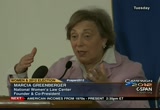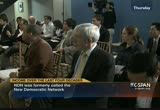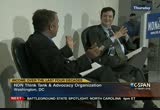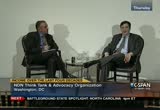tv Washington This Week CSPAN October 27, 2012 2:00pm-3:26pm EDT
2:00 pm
1964 civil rights act also prohibited employment discrimination on the basis of sex and that included pay. and basically the equal pay act hasn't been updated since then. so let's fast forward a minute to lily led better. the name that i know many of you are familiar with. and she had brought a lawsuit. she was in alabama working for almost 20 years at good yeer tire and rubber company. she learned from an anonymous note that that as one of very few women who held a particular position, she had been paid less than
2:01 pm
every other man in this position, including ones who were younger and had started way later on the job. she was disappointed and infuriated by the news. there was a policy that employees could not discuss pay amongst themselves, so she did not know until she got that an anonymous note. and when she learned about the years that she had been paid less, and the implications, because it may start small, but then when you think, over time, wage increases are often percentage increases of your salary. pension contributions are based on your salary. when you add all that compounding up over the years, not only was she earning less each year, in bed each year the
2:02 pm
gap got bigger and bigger and bigger, and when finally she got to retirement, her retirement wasn't weighed smaller than it would have been if she had been paid fairly. the supreme court decided 5-4 -- and i must say after sandra day o'connor left the bench -- 5-4 in case you do not think one judge can make a difference, the equal pay title 7 lot did not take in end. under the law, if you did not file a complaint with the government within six months of the first discriminatory paycheck she got decades before, if she did not file a complaint, whether she knew about it or not, within six months of the first is the mandatory paycheck, -- first
2:03 pm
discriminatory paycheck, that employer was home free. it could pay her less every paycheck from then on. open and explicitly. there was nothing she could do about it except leave the job. that is what the supreme court said congress meant when it passed these laws prohibiting pay discrimination. it was a vigorous dissent from justice and ruth bader ginsberg that this made no sense whatsoever. she was joined by three other justices. first of all, who knowsafter six months that you pay is less -- second, if you know and you have enough of evidence, are you going to file a complaint within six months of the paycheck? are you going to figure, ok,i will prove my work and not be labeled as a troublemaker.
2:04 pm
it basically took that decision in what have some called a technicality and took away women's ability to protect themselves against pay discrimination. they have worked very hard to pass a the lilly ledbetter fair pay act. a major effort ensued by my colleagues at the national women's law center. ultimately, it past four years ago. it was the first bill that obama signed. it got us just back to where everybody thought the law was all these decades. there is a bill regarding the paycheck fairness act that is a modernized and updated and deals with some of the loopholes in the equal pay act to help us.
2:05 pm
it is an economically important issue for women. it did pass the house at one point. it ran into a filibuster problem in the senate. it has yet to pass the paycheck fairness act and vigorous enforcement. these are critically important steps for women's economic security and the security of their families. now we know that women do not work for "pin" money. [laughter] women need paychecks to keep their families going. the children need them. the women need them. this is no laughing matter. this is a technicality. -- no technicality.
2:06 pm
these are hard core policies that politicians decide upon that women need to be informed about in making their own decisions when they go to the ballot box. even more important than what their decision might be when they go is that they do go. i have to say that one of the things about encouraging women to vote -- we have seen some studies -- many women who do not vote think, i do not have that much time to get informed. i do not know the details. it is all very confusing. women can be deterred from voting because they do not feel as knowledgeable as they need to be. it is a reason we have heard repeatedly. so, good citizens, engage citizens need to be sure that
2:07 pm
the facts are out there is so that women and men understand the importance in their daily lives that they must go vote. second thing i want to mention briefly, is the affordable care act. it is a source of so much confusion about what it does and doesn't do. often what it has done, people do not realize that when they see a benefit, it is because of the affordable care after that they have it. one thing is that do not call -- don a whole -- doughnut hole
2:08 pm
for senior citizens where they have to cover more of their costs of prescription drugs once they have expenditures above a certain amount. they would have to cover the costs of the costs until they get more expenditures. the affordable care act has been shrinking not costs. -- that cost and the amount of the whole, and it is on its way to being eliminated altogether. it is enormous savings for seniors and of enormous importance for women. it leaves dollars in their pockets right now and more dollars going to the future. what will happen with social security, there is a lot of discussion about what to do with budget deficits, and properly so. social security has not been a drain on the deficits, but there is a lot of misinformation about it. a lot of proposals floating
2:09 pm
around about privatizing so that people, especially younger people, into the market instead of having a government social safety net. what about social security that covers not only the elderly, but also those with dependent children can also security as well? putting money into private accounts to be invested by people, that is not going to be helpful to the vast majority of people. knowing where people stand on social security is very important. i want to raise an issue related to the courts.
2:10 pm
lilly ledbetter was such an explicit example of how courts can matter. and there are projections. it is hard to know what the tenure will be of the nine justices there are on the court right now. many predict that over time and in the next several years, there'll be one, two, or perhaps more vacancies on the supreme court. every vacancy makes a difference, especially given so many 5-4 decisions. who is in the senate confirming justices to the supreme court, let alone other judges, who is in the presidency making nominations is very important to women.
2:11 pm
there are those -- most people -- there are those that have argued that supreme court precedents that most people have argued and assume are rock-solid are wrongly decided and should be overturned. we have a justice on the supreme court right now, justice scalia, who has said that our 14th amendment in the constitution that provides that individuals have equal protection of the laws should not apply for women. ruth bader ginsberg brought up the keys is in the 1970's that -- ruth bader ginsburg 's landmark cases in 19 70's brought up the facts that
2:12 pm
established of the government could not simply mid different laws for women and men. the 14th amendment was not designed to provide particular protection against discrimination. and all those cases were wrong. roe v wade decided in 1973, many people know about the controversy that it was wrongly -- controversy there with some saying it was wrongly decided and should be overturned. there is a concept that we have a rights that are fixed in stone and that our laws of the past can never be changed. we see so many chances. -- challenges to what seem like bedrock principles. people have no idea that they are up for grabs. let alone the progress that many women in this country are looking for. i will close with those specific and just examples of
2:13 pm
what is at stake. we are not partisan. we have a our web site www.nwlc.com that has -- www. nwlc.org that has information about voting all across the country. i would commend it to your attention. i want to assure you two great posters that we have available. when women vote, people listen. one says, "will we balance the budget on the backs of women and families and?" -- and a monopoly-style very rich guys holding his gold and a
2:14 pm
poor, a bedraggled mom pushing a baby carriage with this guy on her back. here is another one of a mother pushing a baby carriage. the other is "and do your duty." she is clearly a woman in charge and doing hard labor. these are very critical times when women of the object -- we have to make sure women are insisting that their voices are heard. one last thing, there have been 16 states that have made it harder to go. -- to vote. many have been struck down by courts. we are enforcing the importance -- again, reinforcing the importance of who sits on our
2:15 pm
courts, both the state courts and federal courts. these are lower courts and not the supreme courts that have struck many of them down. state courts as well as federal courts, as i have said. there is a lot of confusion. do i need an id? don't i need an id? there have been redrawn districts. where do i go? these have particular impact on women. older women often do not have ids. picture ids. my own mother is 97-years old. i am prompted say she is no longer driving. [laughter] she does not have a driver's license. it took some doing, but she does not have one now. she lives in pennsylvania. for a time, she needed to get a picture id. if she does not have a passport.
2:16 pm
that law -- many people in pennsylvania do not know that the courts have set that law aside. women, when they get married, often change their names. they have up-to-date to valid ids with their current names. how many women are students? often the majority in some college areas are women. are they going to be allowed to vote? these are targeted populations. it is difficult for them to vote. for those who are politically aware, regardless of where you stand on politics, it is essential that people in this country have the right to vote. they need to know what the laws are.
2:17 pm
many of the restrictions have been set aside by the courts. there is so much confusion about the laws. about what they say and what they do not say. there is a toll-free number for people who are confused to find out what the laws are in their area and what they need to follow and to call if there are running into problems. 1-866-our-vote. we have got a lot on our plate to make sure of the one-person, one-vote rule in this country is respected in this election season. women should not be deterred from their ability to vote. that is part of why i am thrilled to be here knowing that this is a group that will determine and encourage women to vote and to make sure that they have the help they need to get out there to vote. thank you. [applause]
2:18 pm
>> we're going to take questions. >> [indiscernible] >> this monday you can begin to vote in the district of columbia. that is true in a number of states around the country. it is possible to go vote. it is important for women who often -- especially when they are juggling families and is possibilities such as the job. -- family responsibility, a job
2:19 pm
responsibility. been able to vote on that one work day on narrow hours can be a burden, as much if there is a line. -- especially if there are lines. taking advantage of early voting or even absentee voting can be a very important thing to make it possible for people to vote. and that is something that is available in many places, including in the district of columbia. >> what about the percentage of women who do go out? -- who do vote? who are of voting age? >> it varies from election to election. i know that at this point, women are somewhat more likely to vote than men. their voting patterns are very erratic. in 2010, for example, fewer women voted than they did in 2008. usually a non presidential
2:20 pm
election cycle, that is the case. but there was a particular dropoff in women at's voting in 2010. i think one of the big unknown factors is how many women will vote? how many young people will vote? there is often skepticism about whether young people will vote at all. in 2008, many young people voted. there are laws that is making it harder for young people to vote. many of that has been set aside. women, young people, hispanic women, women of color, the statistics very. it is a tale that is unfolding. in recent years and since 1980,
2:21 pm
the percentage of women voting has become larger than it used to being. it is still a very big question in this election and has been in recent elections in how women will vote, especially for single women. >> i feel strongly that there are a lot of women who really do not understand what the lilly ledbetter act has done for them. [indiscernible] it is surprising to me that the administration has not use that to court the women's vote and say this is what i did for you. obama talks about signing into law and that there is an
2:22 pm
assumption that everybody understands it. i think that is a false assumption. >> i cannot say that i have followed all the ways that the lilly ledbetter act has been used, but i was involved in a debate a couple of weeks ago that was not in the context of the election particularly, but about whether the lilly ledbetter act was important at all and whether the paycheck fairness act would take things a step further was a good idea or not. there are those who are claiming that it was only a tweak and not important. and they do not get into the details of what it really means for people to have a right that can be enforced or only something been on a piece of paper that is meaningless. that is really what the lilly ledbetter act ultimately meant. there are current laws on equal
2:23 pm
pay that have real force and meaning. i do agree that there is not enough understanding of how central and important it was to pass that law. and the second thing i will save is that there is misinformation that clouds the understanding and makes the job of informing people all the more important. >> the woman said to me that her husband pointed out a little detail in the lilly ledbetter act. do we have any other questions from the floor? >> what about the difficulty
2:24 pm
that college students are having in voting? especially if there are away from home and in school? >> there are things that can affect the ability of college students to vote. one is how easy it is for them to register, especially if you are in a different state or a different part -- your location is not home anymore and you'll be voted at school rather than at home. you have to register based on where you are living. now there had been a trend to make registration easier to do
2:25 pm
and to allow it to happen sometimes the same day as voting. some of the state restrictions started to require specific id's in pennsylvania the is a specific idea requirement that -- ied requirement that -- id requirement that was not the same as the ids that students got from the colleges and universities. the id's that had a students proving that they were living at the dorms, the state would not accept. that is an example. they're so much confusion about what counts and what does not count. there is or that people will not know for sure that they can go -- out without those new --
2:26 pm
vote without those new impediments. second, making sure that you do register within the time frame that is allowed, that can vary depending on the state and location. third, make sure that the voting booths will be made available in a variety of different locations and in a fair way. sometimes particular parts of cities have very few -- compared to other areas. the lines are much longer. it becomes much more difficult for people to be prepared to vote by saying in line for long periods of time. there are many different strategies in which they can operate by themselves or
2:27 pm
together that can make it much more confusing and difficult. is it really worth it? what will it mean for me anyway? of course, for students, their issues around student loans and affordable education and what is happening to state colleges and universities, public support for them, both at the state and federal support, a key budget decisions about supporting student education. those are essential for students, as well as the job market when they're graduating from school and what kinds of policies are out there. one of the big problems for women was when there were budget constraints. many public-sector jobs were being contracted and even layoffs with teachers and social workers and others who
2:28 pm
are largely women losing their jobs. women were hit in a double whammy way. they lost their jobs in the kinds of services they were providing. this affects students in education directly. >> is the media doing a good job in informing the population about issues related to rights and what is why not? >> as far as i'm concerned, the media could always do more. that is for sure. there is a lot of horse race aspect about this -- who is ahead? is it 1%? 2%? those are interesting, but for
2:29 pm
people who want to have the facts to help them decide about how to vote, those horse race stories don't get you very far. and does not help people with what they need to know. take the time to explain what the lilly ledbetter decision is really about or what affordable care act really does in making -- for example, if you have to buy insurance on the individual market as a woman right now, if you go as an individual to buy insurance, i am proud to say that we issued a report that
2:30 pm
demonstrated these insurance companies charge women more than men for the same insurance excluding maternity coverage. in the affordable care act, when it comes fully into affect, we will have eliminated that practice. many people have no idea that the practice is still rampant in the individual market. there are plans and to give people money to buy insurance themselves on that market or maternity coverage is virtually not available to buy in any state for many women. if you can get insurance, you have to pay more as a woman. a woman has to pay as much as 85% more than men at the same age. a 40-year-old woman to is a
2:31 pm
nonsmoker is charge more than a man who is the same age and is a smoker. again, excluding maternity. and the extra charges vary wildly. you cannot say it is actually based. some companies charge of 20% more or 30% more or 85% more. that is not actuarially based. that is complete arbitrariness. that is another thing the affordable health care act would bring to an end. how many people know about it? >> where can people get this kind of information? >> national women's law center is a great resource. we have our web site nwlc.org.
2:32 pm
we have eight different issues with details. we have boiled these down into fact sheets. we have our report on conditions -- pre-existing conditions and the affordable health care act and how women before the affordable health care act really lost out on the ability to get insurance coverage at all, let alone how to pay for it and not have maternity coverage, etc. we have a lot on the budget. we reported on child-care services. 27 states. we have been getting worse. at a time when women
2:33 pm
desperately have to go worked, the cruelty and drying up these child-care resources to those families, let alone what it is doing to the children is mind- boggling if we are thinking of investing in the future and building a stronger country. >> thank you so much for this presentation. >> thank you. >> i would like to mention that there have been articles about how you should use the paper ballot because of voting machines can be changed. there were some changes were the paper ballots are not turned in. we should get paper ballots and you should remember that even
2:34 pm
though there is a voting up until the end -- the hours that you go have shortened. that really does affect, particularly minorities who are taken by their churches on weekend. there are people who do not have any way to get there. n-word in their hours. -- and they have shortened their hours. >> people need to be alert. they need to understand. it might take some effort to go, but the most important thing is to exercise this pressure is right we have in this country. for that, i commend all of you for your efforts and engagement. that is what we need to see replicated all over the
2:35 pm
country, regardless of where people decide to come out at the end of the day. we have a one-person, one-vote system that we have been proud of. it is our duty and responsibility to take advantage of that opportunity. as hard as the hurdles might be in the road, regardless, there are ways of overcoming them. this is an important election to do it. thank you again. [applause] [captioning performed by national captioning institute] [captions copyright national cable satellite corp. 2012] vice-president joe biden canceled a virginia beach campaign rally earlier today because of hurricane sandy. he will be campaigning in
2:36 pm
lynchburg this afternoon along with his wife and son. we will have that for u.s. for 30 p.m. eastern on c-span. tomorrow on news makers, a kentucky senator rand paul will talk about his support for mitt romney. he will also talk about his role in congress and his views on foreign aid. that begins at 10:00 a.m. eastern on c-span. >> is a great source of information for the public. if you want to know anything about what is going on with legislation, with policy, c-span has recovered. i like book tv. that is my favorite. it is nice to see so many people that you read about. c-span offers exactly the news as it is happening. it does not offer commentary. it is just telling you the facts and showing you so you can make your own decisions. the decisions are not being told to you. to me, that is very interesting
2:37 pm
for people who want to be engaged in society and know what is going on. >> c-span, created by america's cable companies in 1979, brought to you as a public service by your television provider. >> now a look at the incomes of americans over the last four decades. robert shapiro talks about globalization from the the i.t. revolution and a shift in policies under the clinton and george w. bush administrations. from washington, this is one hour and 25 minutes. >> welcome, everybody. i am simon rosenberg. we are grateful that you came
2:38 pm
out here today. if we had done an event around polling we would have a few more people, but we are lucky to have joining rob shapiro, the chair of our globalization initiative, our good friend edward luce, who is now the former bureau chief of "the financial times," now chief american commentator and is also a published author. he has recently written one of the more influential or at least highly commentated -- there was so much commentary around his book about whether or not america was in decline in the economic issues we will be talking about today and we feel lucky he took time out of his busy schedule to guide us.
2:39 pm
many of you know rob shapiro, who has a long history of policy leadership here in washington, starting in the early days working for daniel patrick moynihan, to helping advise bill clinton in 1992, and eventually becoming the undersecretary of commerce in the second clinton term. what brought us together is the subject we will talk about today. back in early-2005, when ndn was reborn as a think-tank from being a political organization, i started calling people, and i found something i could not explain. do we have to have sound issues? ok. we began a collaboration that has gone on for eight years in a series of papers we had been
2:40 pm
writing. rob shapiro wrote a book during that time, taking a deep dive and what was happening with the globalization, that looked at the essential issue. we were looking at wages and why job growth was slowing down. one of the things we have come to believe as we try to make sense of the events. the question is, and it is what edward gets to in his book, are we facing a new set of economic
2:41 pm
circumstances that are fundamentally different than the ones we faced before? we were joking the other day that it is a little bit like the u.s. is going through a copernican moment, instead of us believing that we are at the center of the universe, it could be that the universe -- did i get this right? i'm getting my analogy wrong. the idea that the rise of the rest of the world was not only creating a new geopolitical environment, but an economic one and it was possible that our political leaders have not gotten their arms around it,
2:42 pm
and i believe rob shapiro's paper today will provide a better handle on what has actually happened to the american economy so hopefully the next president can take policy actions to make things better than the last decade or so. please join me in welcoming rob shapiro, good friend, a thought leader and economist. [applause] >> thank you. thank you for coming out. thank you to my friends that are here, including senior officials under the secretary of state. i also want to acknowledge doug
2:43 pm
of the senior economic analyst at 9 advisory company -- at my advisory company who did the numbers crunching for this, which is a capacity of mine that has become very rusty. my interest in the issue of what is really happening to the incomes of americans really began in 1988. i was running economic policy in the michael dukakis campaign, and he was making the statement comparing the median income in 1988 and the median income that some significant
2:44 pm
point in the past, whether it was 10 years or 15 years, and he said the incomes of the american people have stagnated. i went to him, and i said in know, that is really not correct. the median has stagnated, but the incomes of the actual people, as people age, they move from below the median to above the median. you're never really capturing the experience. i spoke to political people, and i said people know their incomes did not stagnate over the last eight years, so when they hear the governor say that, and i tried to make it a political point, which is the way economists get listened to in campaigns, they're going to think he is talking about somebody other than them. he must be talking about poor people. that is what the response will be. but, it was still hard to grasp. this has been a common complaint of mind, because this is a mean that has been in american politics now for 30 years. they looked at medians and the same -- and they say the
2:45 pm
average of -- income of beverage americans has stagnated. to an economist, or a statistician, this is really meaningless, because the sample is changing so much over that time. if you have median income in 1970 and 2000, think of the tens of millions of people who were in the sample in the beginning who are retired or dead by the time the sample is over. tens of millions of people who were not in the sample entered the sample. it is a kind of basic principle that the sample has to be stable in order to have anything medium -- meaningful to say
2:46 pm
about it. this has always been a problem. then, it came to our attention region what i always wanted to do, and -- when i always wanted to do, and what would be meaningful, would be to track people's income as they age, and you could capture their actual experience, what was happening to their income. earlier this year, the census bureau announced it was putting on-line data which gave you the median income of all of those by each age in each year. so, you could track the income of those that were 25 in 1975, 26 in 1976, 27 in 1977, etc., etc., and by doing that you would be able to see what was happening to people's income directly, so that is what we set out to do.
2:47 pm
the results are what i had believed they would be from observing other data, and that is that people's income, the incomes of americans in general that were working, because i only decided to look at earnings -- wages and salaries -- i was not looking at capital income. i thought i want to know what is happening as a result of people working in the economy. i was not looking at income, but what economists call earnings. earnings, in fact, it grew at a
2:48 pm
healthy rate. we started with the expansion in the second half of the 1970's, the carter expansion, 1976 to 1979, where they grew by an average of 2.8% a year as people age. then we looked at the reagan expansion, from 1983 through 1989, and they grew -- that is the median -- growing by 2.2% a year, i believe -- 3.2%, and then we looked at 1992, and it grew by 3.8%, all adjusted for inflation, and then to test the proposition, which i have written about a lot, the basic economic conditions have changed in the last decade, but there is something very distinct which has had a significant effect on job creation and income, which has happened since 2000, and which was not there before, so detracted from the 2000 to 2007 expansion, and it
2:49 pm
falls to 0.5%. that is what the data says. as people age, during expansions, incomes grew persistently and steadily with the expansions of the 1970's, the 1980's, the 1990's, and then we hit 2000 and that stopped. the reason i thought about this is i have looked in the early part of 2004 when i became interested in what was happening to job creation, and i looked at what happened in the 2001 recession, the briefest and
2:50 pm
most mild recession in the post- war area, and we had lost more jobs than we had in much deeper recessions, and i adjusted for declining growth, and in fact, where as there was a general pattern of how many jobs you lost based on how deep the recession was in the recessions of the 1970's, the 1980's, and the 1990's, and this was six times as much, and we did not begin to create jobs again for two more years. we kept on declining after the recession ended four a year, and then after that it was creating private-sector jobs have -- half the rate, relative
2:51 pm
to growth. so, that was my first in sight into something different happening in the economy today. i used to talk about it in 2004 and 2005 with other economists and brainstorming sessions, and you were at some of those. and they would say you see structural changes everywhere. people now and acknowledge that something very fundamental has happened to job creation, and
2:52 pm
wages are the flip side of jobs. the same thing. it is the labor market. to me, this was not unexpected. when you track income during recessions in the 1970's, the 1980's, and the 1990's, people give up between 1/4 and 45% of the gains they make in the previous expansion. you still start off significantly better off than you were at the beginning of the preceding expansion. it always goes like that, and then it stopped going like that. so, what we have to understand the depth of the political disappointment and anger that has dominated the political
2:53 pm
cycle, is that we have to understand that for the first time in the history of anybody working americans went through a long expansion, and got virtually nothing out of it, then went to a deep recession where they lost a lot of ground, so for the first time they really are worse off. we have been seeing this now, as simon rosenberg as always pointed out to me, 43 electoral cycles the 3 -- for three elect four of cycles, and the first one in 2006 they said we are throwing out, the democrats came in, and then in 2008, and then in 2010, republicans make a. i think this year, both parties are going to take the blame. i want to make two other quick points. i tend to talk too long, and
2:54 pm
one is in the paper. there are two startling findings, and they have to do with gender and race. the gap between how much progress men and women make, of the same age, as they age, is much bigger than i expected. it is very large. we are talking about between 40% and 50% over lifetime earnings. it is much bigger than the gap in pay between men and women at the same job. it has come down by half over the last 30 years because 35 years ago, remember, over a lifetime we are making double, but it is still very large, much larger than people will expect and that i expected.
2:55 pm
i think it reflects two things. one is different races of jobs -- different faces of jobs and professions. there is a much greater share of women that work part-time instead of full time. this captures just working men and women, and it does not distinguish full-time and part- time because if you did you would lose a lot of the actual movement in income because a lot of people move from full- time-to-part-time.
2:56 pm
if you're only looking at full time, you would miss a lot of this. that is one finding. the second striking finding is that the gap between earnings and the rate of growth earnings of blacks and whites is much smaller than i expected, and much smaller than that between men and women, and i think that is a new finding as well. now, i think part of what that does not take account of is the differences in employment rates. we're only looking at working people, people that are actually working, so it does not take account -- this is not average income.
2:57 pm
this is earnings. so, everybody has some income, but you have to work to get earnings, so i think that is embedded in that, but i think we have underestimated the process that has been made in economic equality with respect to people on the job by race. there is data for hispanics as well, but frankly it is not good enough. the samples are too small, so i did not attempt to do that. if we do not know what is actually happening to people's incomes over time, we can never hope to fashion policies to affect it. if we do not recognize that the choice is not between the
2:58 pm
policies of ronald reagan and bill clinton. they both achieved strong income gains, and carter, for that matter. so, the question is what happened under bush. you have to look at the change in the conditions, and i do not blame bush, except that he did not respond to evidence that conditions had changed with respect to what was happening in labor markets. it focuses on what was so different about the last decade as compared to the last 30 years that can begin to explain what has happened, which we first noted in jobs and can now document in people's incomes as they age. that is the beginning of a serious economic policy discussion. thank you. [applause] >> thank you very much, that
2:59 pm
was very interesting and provocative, and i will get into that presentation. when i moved for the second time, rob shapiro and simon rosenberg, and to some extent jared bernstein, really gave up the huge amount of time to give me a crash course in these issues. i feel sort of dirty interrogating you now, but i have been in india for the last five years and the idea but median income stagnation mattered that all had not gone on me, but since moving back here i have come to see it as a central fact of america's political economy. thank you for that presentation. here is a geeky question from a non-statistician, since the early 1970's, we have had
3:00 pm
overall median income stagnation, but during that time, most age cohorts have seen their incomes rise over their lifetime. now, these are perfectly compatible with each other, but a little bit counter-intuitive. if the median is flat, how much -- how come most age groups are getting better off? sure. again, the median is just picking a midpoint in the distribute yp of data. so you have everybody's income or earnings in this case and you just are picking the midpoint where you talk about the median. it is -- and it is the midpoint successive mid points year after year. what i don't want to suggest
3:01 pm
that the fact that median income looks much the same. there is some that kind of goes like that. but looks much the same inflation adjusted dollars nooze significance. it does have significance. what it tells you is after tracking people's incomes as they age is that the gains that people are making mirror in effect the gains their parents made. that is, the whole structure has not moved up. so that people become in effect as prosperous as their parents became or their older sisters and brothers became and not more so. not less so. which is in effect what the notion of stag nation would have said. but rather, that for -- we
3:02 pm
suspect -- and i haven't done the analysis. but i suspect if you looked at 40's, 50s and 60s you would see something different. that you would see in effect the incomes of -- is another way of expressing it. that the incomes of each generation rise at faster rates than the incomes of the previous generation. what we're seeing -- and i suspect that happened in the 40's and 50s you were coming off the depression and so on. what we've seen is incomes rising at largely the same rate . but rising steadily. and persistently. predictably. until the 2002-2007 expansion and then it stops. >> and you've got a lot of
3:03 pm
interesting findings in here but obviously that's the most important. but there's a big rupture between what happens to the middle class up until the late 1990s and then what's happened since then. and you say that the difference between how the clinton administration managed the economy and how the bush administration managed the economy doesn't explain everything. >> no. >> could you explain everything? >> well, yes, i can. and now i have to take a call from the noble committee. i have used about -- i have views about what has happened and it really begins with kind of a common-sense observation. if you've got this big a shift in the way the economy operates for 150 million people, you have to look for something very big to move the economy to
3:04 pm
alter the way the economy produces rewards to that degree. and as i said, i began to try to think this through not to understand this but to understand what had happened to job creation, which is also had been very steady. and to me there are three fenen m which are big enough. i just haven't proved this impirkly. one is globalization. you do see there is a clear shift in the intensity of globalization from the 1990s to this decade and you see it in china. china is the leading example. in 1995, chinese exports were about $65 billion and in 2008 there was 685 billion something like that. this enormous increase.
3:05 pm
unprecedented increase. and indeed, look, it's in part because of the wto and it is the creation of the wto and it is in part because of technology. you had this per septible takeoff with respect to their relationship to the global economy of not just china but indca and parts of latin america and certainly eastern europe. you saw this all over the world. >> this would be reflected in the proportion of sales derived from overseas. the rapidly -- >> yes. >> steepning of that curve. >> so what difference should that make? well, it's to me part of it is -- part of it reflects yes outsourcing of jobs from the united states and from other advanced economies. and that has an income and jobs hit. but to me, the larger effect is
3:06 pm
for a second i tried to think like a microeconomist. this is globalization is actually about the creation of tens and tens of thousands of new businesses who are competing with businesses usually in their own home market. so chinese companies competing with u.s. companies in the chinese market. or in asian markets where china's exporting to. and also, the united states our companies competing more with european companies in chinese markets and as it progresses in our market as well. and even if it's u.s. companies in china, the importance of this is that these
3:07 pm
intensification of competition makes it much harder for companies to raise their prices. and it reduces price leverage it's called and the importance of that -- we know this is happening because we have really low inflation throughout the decade. they couldn't raise their prices. or not as much. the importance of this is that u.s. companies also have very significant increases in costs and in particular in health care and energy and pensions. so what do you do when you have these big increases in costs, competition makes it very hard to pass on the costs? you cut other costs. and i think this has put enormous pressure on wages. so i think that's part of what's happening. the other thing that's happened is that is of the scale that
3:08 pm
can move an economy like this which again you first have to recognize that the movement has occurred and when it occurred. is the spread of information technologies across the economy and which is part of an even larger phenomenon which is the dominance of ideas or intangible assets in the creation of value in the u.s. economy. this is a big development. again, it started -- didn't start in 2000. it came much more to fruition in the last decade where the most important assets of u.s. companies became their intangible assets not their equipment, not their equipment buildings et cetera. and when you looked at what
3:09 pm
share of the what's called the book value of a company, that is how much of its value could be attributed to its physical assets. you see a sharp and steady decline that begins in the 80s and continues into this decade falling from 75% to probably 35%. so that means not only was everybody using information technologies which meant you had to be good at it in order to prosper and one of the things we see is that the older the generation is the worse they did in 2000. and i think that's part of what we're seeing there. but in addition, the value that most companies were creating
3:10 pm
depends on your ability to create these intangible assets or work with them. and so you saw also a -- so it wasn't just that you had -- that everybody was using information technologies and some people knew how to use it better than others but rather that those people whose training and abilities allow them to create and build on ideas in whatever context. their labor became much more valuable because that was what was creating value from those corporations. not your ability to use machines. so to me, those are where i begin to think about it. >> just a final question on the pre-2000. because the general narrative has been most people's understanding is that we've had stag nation from the 70s. the 80s was the big exception.
3:11 pm
that's when the rising tide lifted all boats. your data makes us look at the information differently. in terms of the sort of mounting economic woes besetting the middle class, i think of this as a triple cocktail. and maybe i've plagiarized your phrase. >> no yours. >> rising income inequality and declining intergenerational income mobility. this triple cocktail is very much something that's been in each case getting worse for the last 40 years or so. the other two bits of that triple cocktail, the bits you don't address in the paper, how the 70s, 80s, 90s fair in your view? do we need to reapprise our view and the declining mobility of americans? >> well, there's -- we didn't
3:12 pm
look at inequality at all. but it is, -- but we know the aggregate data. and this is just a way of shorthanding it. in 1928, the top 1% claimed 23% of all income earned in the united states. that percentage fell from a high falls steadily and gradually -- not quite steadily but nearly steadily, and gradually from 1929 to 1976 wheng it hits 8.9 prs. it goes from 23 to .9 and then it starts turning around. and from 19 77 to 2008 it goes to 23.5%. perfect though. remarkable.
3:13 pm
and there is economists are just trying to figure out how inequality affects growth and incomes. but look, one thing is clear and that is even though it should not really affect -- well it does affect the median. it acts both the median and the average. and that is income inequality and increase in income and inequality is an increase in the share of the of income national income that's being claimed by a relatively small share of people that leaves less for everybody else. and so it may be that the that inequality would be another way of describing the increase in
3:14 pm
inequality. and i haven't looked at how much it increased from 2000 to 2008. can explain -- is another way of expressing what was happening to the median. just because it was less left over. but the fact is it was rising very sharply in the 80s and 90s as well. and where we -- and you would think it was pretty high in the 90s if it reached 23.5% by 2008. i assume it was 16 or 17 maybe 16 or 17%. so and it did not seem to have an effect then. or the effect was overwhelmed by other effects. >> and then class mobility? >> well, there's a certainly it's virtually stopped in the last decade.
3:15 pm
it is -- you can interpret what we found to say that in effect you start middle class, you're going to -- you are likely to end up middle class, too. but that is you are likely to follow the same income path as your parents. and look, the -- this is our first cut at these data and you've raised really interesting questions. >> you're less likely to your parents to jump in income quinn tile? >> no it suggests you're equally likely. host: ok. >> and not more likely.
3:16 pm
>> not more or less rr? >> not more or less. but the truth is that's very hard to judge from the meedium. and there are lots of other things that we can find in these data when we go back to them and when doug goes back to them and we will have more findings over time. >> let's get back on the policy implications of your findings. clearly globalization sort of hyper integration that's gone on with the global economy since the late 90s. the it revolution. these are the two sort of biggest explainers. >> right. >> but you did say that the shift in policies between the clinton and bush eras also played a part. could you discuss which policies and what part? >> well, i think what we can say is it's interesting --
3:17 pm
well, ok. i was going to avoid your question by talking about clinton and reagan which i find interesting, too. but we'll talk about -- >> since the shift. >> clinton and bush. that's correct. what we saw in 2000 certainly was -- well, there were two things. one was obviously large reduction in taxes. and the second was not so much deregulation as an explicit policy of very lighthanded regulation. now, to me that actually goes both of them go more to the financial crisis as contributing factors in the financial crisis than in what
3:18 pm
happened in the to jobs and wages. i think -- i used to say -- i didn't really blame bush for what happened to incomes and jobs. i blame him for not trying to figure out what was happening. that, you know, a lot of us know president clinton -- if bill clinton had any -- had seen the jobs record that was emerging under bush, after a year he would have called everybody in his office and said what the hell is happening? do something about it. and there was certainly no sense of urgency about that. and what could they have done? see, these were new conditions. and so i wouldn't say that it was the policies rather it was the absence of policies to respond to the new conditions.
3:19 pm
>> to be clear the shift in tax. the two bush tax cuts are no more significance than the reagan era taxes and the clinton era taxes? >> one of the things that's interesting here, there does not seem to be a significant any kind of discontinuity when you really cut tax rates and when you raise tax rates. they both have very modest effects. i think the clinton and reagan -- and this is important for the current era -- their records tell us you can address deficits aggressively and not interfere with income growth so long as the economy is expanding aggressively. which is something -- >> and you can explore deficits and not have much impact on income growth as reagan. >> yes. and so long as you pul it back.
3:20 pm
which was what reagan did. you know, and reagan did it of course largely through tax increases. more through tax ip creases than -- republicans don't talk about this. but his spending -- the only thing he did in spending after the deficit really exploded in the 80s was he stabilized defense spending. that stopped rising sharply. he had very few cuts. but he raised taxes repeatedly. he raised payroll tasms, energy taxes, and business taxes. and -- >> just to be clear on bush the fact that he didn't recognize the problems that you blame him most for. >> yes. host: >> get in a minute to what you think the policy remedies should be. but just to -- i think the data only goes up to 2008. >> well, 2010. >> so in 2010.
3:21 pm
this problem has been getting worse not better as the 21st century goes on. so under the obama administration there has been no change of trend. >> no. in fact, it's worse. i mean, and that is you had what you expect, which is a -- we had a recession and in previous recessions you give back some of what you gained. in this case, we gained almost nothing but we gave back a lot. so we were giving back both from this t gains in the 2002 to 2007 expansion plus some of the gains that had carried over from the expansion of the 1990s. that's why people are really annoyed. hard to blame them. and although i've got to remark, the -- when we think
3:22 pm
about those bigger -- those large structural issues of the importance of ideas and information technologies and globalization and global markets, there are certain cohorts, professional cohorts who have been untouched by this literally untouched, probably benefited in this last cycle. and that is those who are perfectly positioned to be -- to sell their services globally and who operate entirely in the realm of idea. and it describeds a lot of people in washington. and i don't like the term political class, but the insulation of people with influence on policy what you
3:23 pm
expect has an effect on the sense of urgency that is prauth to these questions. that's -- i mean, i believe that's the case. but you know, again, i don't have any data to -- >> eliptcal criticism of the obama administration. >> no. it's the -- >> so generally everybody. >> everybody here. including myself. >> it's a -- there has not been a sense of urgency. there was no sense of urgency in the bush administration. i think the obama administration has shown more urgency and at real political cost. and let me say the obama administration has begun to address some of the factors. the health care reform includes the first attempt to put in place across the board ways of slowing the rate of growth of health care costs.
3:24 pm
now, i think those provisions are -- we need to be -- they need to be on a bigger scale and they need to be stronger but they're there. it's the first time we've put them there. and they've also made a concerted effort to increase energy efficiency across businesses as well as individuals. that's also that's the only effective way we can address energy costs as a factor in the business costs that squeeze wages. >> let me ask one more question because we have people here should get the chance to ask. i remember when you gave probably your first briefing on this subject to me six or seven years ago. it struck me what an enormous complex and -- problem we have here namely how to sustain the income growth of most americans or regain it.
3:25 pm
but that you'll your remedies at the time i felt were rather small in comparison to the diagnosis. i remember you used the phrase you diagnosed cancer but you're prescribing aspirin. have you come up with stronger medication since then? >> well, i've come up with some medications. but you know, i try to be realistic in the sense that look, you -- we can stabilize health care costs. we can do it the way japan does it. the way britain does it. we can control all health care prices and wages. that's what they do. that's what every other major industrial country does.
3:26 pm
177 Views
IN COLLECTIONS
CSPAN Television Archive
Television Archive  Television Archive News Search Service
Television Archive News Search Service 
Uploaded by TV Archive on

 Live Music Archive
Live Music Archive Librivox Free Audio
Librivox Free Audio Metropolitan Museum
Metropolitan Museum Cleveland Museum of Art
Cleveland Museum of Art Internet Arcade
Internet Arcade Console Living Room
Console Living Room Books to Borrow
Books to Borrow Open Library
Open Library TV News
TV News Understanding 9/11
Understanding 9/11





















































































